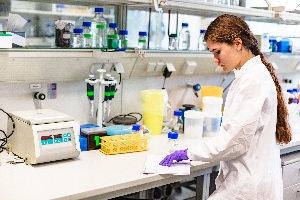The most commonly known pharmacy careers are probably those in community pharmacies, hospitals, and clinics. However, the world of pharmacy is much broader than that. One exciting and often overlooked pharmacy career path is pharmacology research. People in this field blend science and innovation to discover and develop the medicines of tomorrow. If you are interested in pharmacy but haven’t considered pharmacology research, here’s what you should know.
What Is Pharmacology Research?
 Pharmacology research focuses on how drugs and chemicals interact with the human body and how the body responds to them. In other words, pharmacy researchers (also known as pharmacologists) study how medications work in the body, including potential benefits and side effects.
Pharmacology research focuses on how drugs and chemicals interact with the human body and how the body responds to them. In other words, pharmacy researchers (also known as pharmacologists) study how medications work in the body, including potential benefits and side effects.
Pharmacology research guides the development of new treatments. It can make existing drugs safer, more effective, or easier to take. It can also arm healthcare providers to make better choices when prescribing medicine. In addition, pharmacologists may explore how to personalize therapies based on genetics. Without pharmacology research, the medicine we rely on every day, from antibiotics to cancer treatments, wouldn’t exist.
What Do Pharmacology Researchers Do?
A career in pharmacology research can take many forms. Pharmacology researchers can work in universities, pharmaceutical companies, biotech firms, hospitals, government agencies, and more. Depending on your specialization and where you work, you might:
- Design and run experiments to test new drugs or therapies.
- Study drug interactions to see how medications taken together affect each other.
- Analyze data from clinical trials to study safety and effectiveness.
- Investigate genetic and molecular factors that influence how people respond to medications.
- Work with physicians, chemists, and biologists to turn lab findings into real-world treatments.
- Prepare information for agencies like the FDA that review and approve new drugs.
As you can see, science is a big part of this career, but so is teamwork, problem-solving, and communication!
Qualities & Skills Needed for Pharmacology
To work in this pharmacy career, you’ll need a strong handle on biology, chemistry, and math. Other helpful skills and qualities for pharmacologists include:
- Attention to detail
- Being able to design precise experiments
- Critical thinking and analysis
- Curiosity and persistence (Research requires patience and repeated testing.)
- Ability to work as part of a multidisciplinary team
- Communication skills for sharing findings in reports, presentations, or publications
- A passion for advancing healthcare
Why Choose Pharmacology Research?
For students motivated by curiosity, love of science, and the desire to make a lasting impact on healthcare, pharmacology research offers a uniquely rewarding future. In this pharmacy career, you could help create new medications that one day save lives or improve the quality of life for millions. Being a pharmacologist also offers variety. Your work could range from investigating cancer therapies to developing safer pain medicine or studying how genetics influence drug responses.
Beyond personal fulfillment, pharmacology research is an evolving field with opportunities across academia, industry, and government. With advancements in biotechnology, personalized medicine, and genomics, pharmacologists are at the forefront of some of the most exciting developments in healthcare today.
Is This Pharmacy Career Path Right for You?
Pharmacology research may not be as well-known as other pharmacy careers, but it’s essential to the healthcare system. Without pharmacologists, new drugs wouldn’t move from idea to reality.
If you’re fascinated by how medicines work and enjoy solving scientific puzzles, pharmacology research may be a career path worth exploring. It requires commitment and advanced study, but it offers the chance to help shape the future of medicine.
Elevate Your Potential in Pharmacy
At the South University School of Pharmacy, we encourage our students to explore the many career paths available in pharmacy, including research. Our Doctor of Pharmacy (PharmD) program is designed to provide a strong scientific foundation and opportunities to connect with faculty engaged in a variety of research projects. Whether you’re drawn to patient care, research, or both, our goal is to prepare you to make your mark in the pharmacy field.
Visit our PharmD page to learn more, or request information to speak with our Admissions team.
--
*Graduates are required to pass the national certification exam and obtain a state license in order to work in the field. (Exam names vary by program.) Please refer to the State Professional Licensure Determination and National Certification/Licensure section of the University catalog for additional information. South University cannot guarantee each graduate will pass the required licensure examinations. South University does not promise or guarantee licensure, employment, or salary amounts.




